#The Luo family drama echoes on forever...
Explore tagged Tumblr posts
Text








"Mǔqīn wouldn't want this, Qiangyi."
"...But Bàba would."
"And yet neither are here."
#ffxiv#screenshot#Ephemeral Blooms#Luo Qiang#Hyur#And featuring his dearest eldest Brother: Luo Xue#The Luo family drama echoes on forever...#they haven't met IC'ly yet#but I was inspired nonetheless
43 notes
·
View notes
Text
Granting You a Dreamlike Review
In my previous post on Granting You a Dreamlike Life, I went over a few early reasons on why it’s a very watchable car-crash, and I saw a few people expressing interest in what I have to say once I have finished the show. Apparently, I have to say quite a bit.
Vague spoilers for the general story with no details. I am adding gifs, but steering clear of spoilery ones.
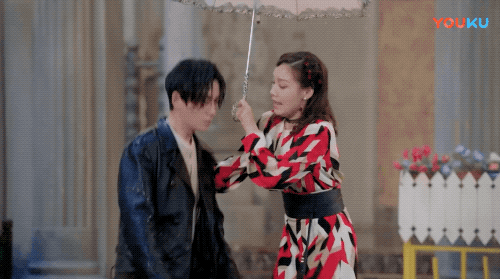
The framing device
On paper, the reincarnation framing device works. Two people meet, we discover that they experienced this epic tragedy in their past lives, then they get to know each other all over again in the twenty first century. It’s a cliche, but there is nothing inherently wrong with that. But, as is the case with most of this drama, it manages to take a sane sounding idea and make it completely incomprehensible.
As it happens, after the viewer witnesses a melodramatically tragic ending to the main story line, they abruptly move to the present time for only about twenty minutes to see reincarnated characters faff around with thematic dumpling making for what appears to be one day, then getting separated for three years, before accidentally meeting again and instantly deciding to be together forever. It’s not just rushed, it feels like a massive let-down.
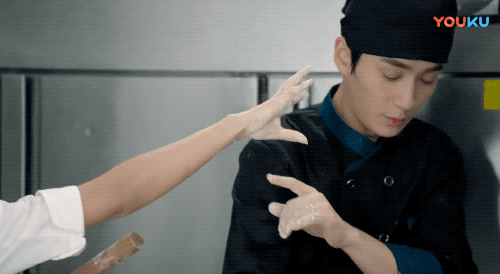
Say what you may about the writing of the main narrative (I know I will say many things about it), but it does get some things right, and the slow, gradual, logical development of the relationship between Tianying and Luo Fusheng is one of those things. It makes sense, because we see them grow into each other’s orbit, and we witness Fusheng becoming a decent human being under the influence of Tianying. Their future counterparts do absolutely nothing to justify them having this post-death happy ending. We know that they are meant to end up together because they are the protagonists of a romance drama, but there is nothing within the narrative itself that would make it so. To make matters worse, there is this really strange angle where Fusheng’s future self (called, hilariously, Musheng) explains that Tianying’s future self (Jingyun) looks and acts exactly like his dead fiancé, and there is a hint of symbolism there, echoing Lusheng/Tianying’s narrative, but it makes the framing device even more muddled.
Considering that we have spent the overwhelming majority of this show’s runtime with the 1920’s/1930′s characters, I almost wish the writers chose to forgo the framing device completely, and made the ending of the show about the aftermath of the events we saw unfolding, instead of undercutting them.

The main narrative
If I were to make an attempt at summarising most of the show’s 40 episode run, it would go something like this: Dreamlike’s story is centred around family clans still reeling from a big falling out some ten years prior to the events of the show, with the heads of all the clans driving tensions high in the city, and a newcomer mob family threatening the fragile equilibrium. It must be up to the younger generation to make sure that the war does not break out in the city of Dongjiang.
That sounds pretty decent, but, remember, if there is a sane sounding idea then Dreamlike will render it completely incomprehensible.
Setting aside the fact that said misunderstanding, which is meant to be meticulously crafted by one of the parties, completely falls apart if you give it about three seconds thought, Dreamlike’s writers make a questionable decision to clear the misunderstanding at episode 35, resolve the main conflict at episode 36, and then promptly make the story about the last-minute big bad appearing out of the blue. The big bad happens to be the Japanese, led one of the minor characters who was a villain all along. That villain is a Japanese spy, but they live in a Japanese-style house and wear Japanese costume all the time so why they were never discovered is anyone’s guess. As the Japanese were never even mentioned prior to that, a lot of retro-fitting needs to be done to shove them into the narrative, and even more hoops needs to be jumped through to make sure all the characters are involved in the final conflict. The result mostly consists of info-dumps so dense they are quite hard to follow, and narrative twists so severe they lost me completely.
If you think the love hexagon I mentioned in my first set of hot takes was convoluted, the final five episodes are that but on steroids. I spent quite a lot of said episodes pausing, rewinding, and screaming into a pillow.
Again, on paper, all the family clans coming together to unite against the common enemy, does not sound terrible, and there is nothing wrong with the pace escalating dramatically towards the climax of the show. That said, attempting to tell a very dense spy story with no set-up in the span of three episodes is... misjudged. As audience, you start on the back foot trying to catch up with the galloping narrative, and then remain on the back foot until the show runs out of characters to kill on screen.
This also means that while the final stand-down is aiming for this intensely epic tragedy with known characters dropping left and right, it ends up being mostly unintentionally funny. There is one death, notably, that made us heckle and scream-laugh because the motivation for that character checking out was utterly unclear. Unfortunately, only one character death affected me in any way whatsoever, mostly because it was underplayed: there was no slow-motion montage of their life, they did not die in the arms of their loved ones to a guitar riff-filled soundtrack (a strange musical choice for death scenes, whichever way to look at it), they did not weakly monologue about their feelings while spluttering fake blood out of their mouth. They were shot and they fell down, and for the first time in the whole show I felt an emotion that was not amusement.
Why? Because less is more.
Character development.
One thing Dreamlike does reasonably well in terms of its writing is this: it actually spends time making sure its characters develop and grow. It’s not always done well, it’s not subtle, but it’s certainly there. Most prominently, Luo Fusheng growing from this devil-may-care mercurial bad boy into a grounded, sensible head of the family works remarkably well. This is in equal parts due to a reasonable script, and Zhu Yilong’s acting, which I would maintain is not nearly as strong as in his more recent work, but is still head and shoulders above the majority of the cast.

Thankfully, Fusheng’s relationship with Tianying does not develop into a loving one before he starts respecting her wishes, learning to see her as a partner and not a object he can win, and she, in turn, calls him out on his less savoury actions without it becoming negging. They end up grounding each other very nicely, their relationship getting to the point where you, the viewer, see that they are actually good for each other, and root for them to be together, before the two even become a couple. Considering that their story started with Sexual Harassment as Courtship, I am very pleasantly surprised by it developing into something so wholesome. And I still very much like An Yuexi, she is lovely as Tianying.
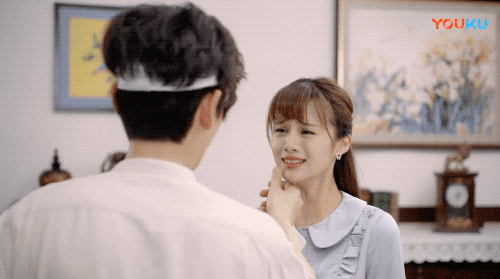
Xu Xingcheng’s character development, in stark contrast, looks so abrupt it more or less makes him into a hammy comedy villain. Apparently, losing a girl he is obsessed with is enough to make him go full Darth Vader (complete with a cape) and then stubbornly remain that way until his very brief redemption. There is also apparently an amount of scenery chewing that flips a performance from delightful to tedious.
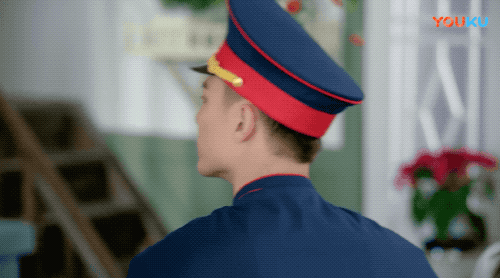
(He is in the Police of the Republic of China, which is basically a short-hand for “evil”. Also I guess we are actually in late 20’s-early 30’s.)
For a show that rushed to bring every character’s narrative to a conclusion (which included writing in a long-missing character with the only intention of killing them on screen) Dreamlike completely fails to bring the stories of its women to any sort of resolution. Tianying, who said that she wanted to be a film star, and to sing again so that she would marry opera and film, did a complete 180 late in the series and just completely abandoned her work.
Lin Xingyuan has not achieved anything whatsoever, even though she was - perhaps, not deliberately - the most reasonable character in the series.
Sidelining Hong Lan was the strangest decision. Not only did she undergo very satisfying character development of her own, growing out of being a spoiled brat and learning to take all sorts of responsibilities, and not only did her story touch heavily on domestic abuse and left that completely unresolved, but Hong Lan had every reason to be involved in the events of the final few episodes to the point where her non-involvement is actually noticeable. She is left behind the scenes with no explanation, her story left hanging in the air. Cheng Yanqiu, who portrayed Hong Lan, is honestly not half-bad, and she was done very dirty by this show.

Building a mystery
One of the biggest narrative questions of the show is Tianying’s true identity.
We get a hint that she is maybe adopted, and perhaps not just a mere orphan either, quite early in the story. Then, there is a scene in which one of family leaders reminiscences about his lost daughter, adding that she would have been twenty two were she alive still. In the very next scene Tianying mentioned that she is a full grown-up twenty two year old.
So, that’s that mystery gone in an instant. The mystery is no more before any other “hints” are dropped, before Significant Jewellery comes into play, and good twenty episode before the backstory gets revealed in full.
And, alright, you may say that maybe it’s not about the audience discovering the truth as much as it’s about the characters doing the same, but if that is the case why oh why does Dreamlike make no less than six explanations of the Significant Jewellery: the person who made it reveals its origin on screen to two different characters, and then rounds are made, explaining it all over again to other characters. In the best traditions of bad screen plays, audience is forced to see every agonising second of something they have known for a long while being explained over, and over, and over again.
Editing and quality control
If you are watching the series on Viki, there is a scene in episode 39 with shots are left unrendered and time-coded, but either this is something that was fixed later on, or this problem was created during subbing, because this issue is not present on Youtube. Which means that the editing team has, in fact, done the barest minimum of their job.
The editing overall is sloppy, and has several quirks that are very noticeable, such as the absolute majority of the scenes being several seconds longer than they need be. It’s true that there is usually a delay between the scene playing out and the director shouting “cut!”, but leaving this dead space in the final product just bogs it down.
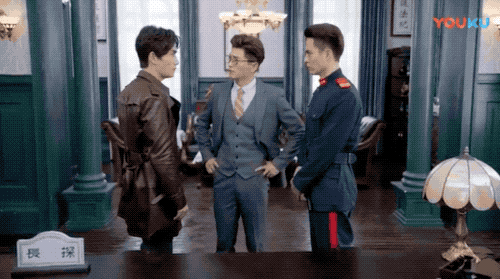
There were also, hilariously, scenes that cut to black and then are brought back to life, as in a choice was made to pad them for runtime and no one bothered to edit transitions. This creates a curious dissonance within the pacing of Dreamlike, which on a macro level is still so fast it makes the story hard to follow, and on the micro level is screechingly slow. If shows could get arythmia, this is what it would look like.
On top of that, there little continuity issues, or colour-grading glitches, or scenes shot across a period of time with no one making sure the light actually matches.
And it’s funny, but it’s also kind of sad. How can you expect me to care about this drama if the people who made it clearly did not?
Action coordination
The action sequences are, for the most part and barring the final confrontation, pretty good.
What?
I am dunking on things that warrant dunking on, and the fights certainly do not.

And yes, one can definitely nitpick them for small mistakes here and there (looking at our boy Zhu Yilong here who decided that grabbing his sword by the blade was a good idea), and the editor certainly does not help, but this show’s stunt coordinator had done a very admirable job, and his stunt team are fairly good as well.
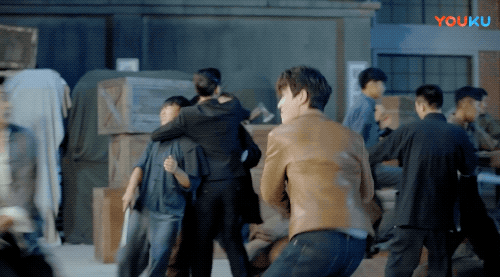
Hero fights - one lone hero against a wave of enemies, that is - are never easy, and Dreamlike manages to pull them off pretty well. More than that: action sequences have a logic to them, they effectively tell a story, they look interesting, and characters shine through the moves. Most notably, Xu Xingcheng’s brawling sequences during his police bootcamp are excellent.
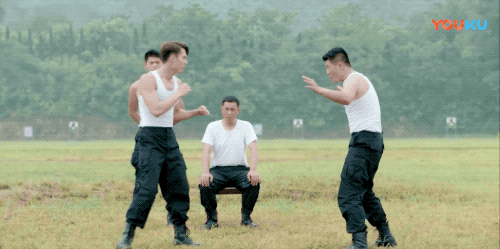
None of the above applies to the final shoot-out. I have nothing good to say about that: it’s geographically confusing, and full of physical impossibilities, which lowers the stakes at every turn, and contributes to the alleged emotional highlight of the series being unintentionally funny. But apart from that one, the fights - especially ones with cold weapons - get a thumbs up from me.
Film industry and misc. observations
Half-way through the series Tianying becomes a film actress. You’d think people working in recorded media would maybe make content that adequately represents their profession.You’d be wrong. Aside from the obvious - they are filming talkies, and there is not a single piece sound recording equipment in sight - there is just so many baffling bits happening on set. From directors throwing away the script and just letting their cast run completely unsupervised, to venting your own personal grievances through the scenes (not okay), to waking away from the set (super not okay), to spewing utter nonsense about acting as a profession. You really feel for the cast that has to deal with all this with straight faces.

It’s pretty funny how there is a scene where Tianying is bullied into performing multiple takes in which she has to drink alcohol. The narrative significance of the scene is that we see that one fellow cast member treats her poorly while another has her back, but on a meta level…
Is this not a very clear illustration why the cast should not be forced to drink alcohol on set? Especially in the scenes that feature intimacy or fight choreography? The show hits it on the nail with it being a bad idea and then proceeds to do it to itself.
I know it’s not a Dreamlike feature as much as just a Cdrama feature (and perhaps on the wider scale an East Asian television feature), but every time I really feel for the cast when they do it.

Dreamlike does quite often substitute hard liquor for either the strange yellow liquid or flat beer. Needless to say I preferred the former - not only because it’s likely to be non-alcoholic, but also because it does not foam when being thrown around.
So. This was Dreamlike.
I could say more, but I’ll stop here.
Dreamlike was pretty bad, but I enjoyed it even though it made me scream and despair. I kept coming back even after I rage-quit watching it a couple of times.
Incomprehensibly, I don’t regret spending some thirty hours of my life on it. That said, I feel a strange sense of relief knowing I am finally well and truly done with this drama.
----
Side notes.
Next up, the Rebel! I have been very busy and unable to catch up properly, but there will definitely be thoughts on that because what I have seen was stunning.
Oops this is now accidentally a review blog.
(Guardian recaps are not dead, I just had a very hectic couple of weeks with work and such so it’s a little involuntary hiatus. I am half-way through drafting Episode 14, so it will be here eventually.)
32 notes
·
View notes